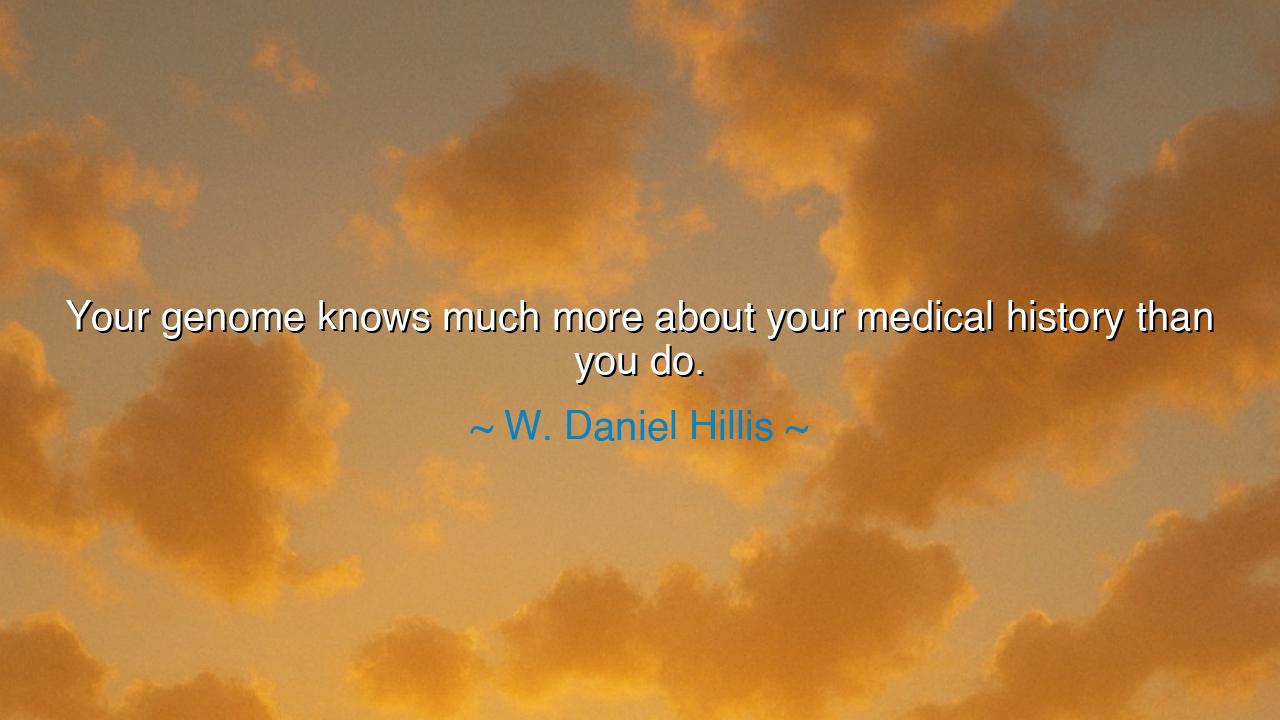
Your genome knows much more about your medical history than you






The words of W. Daniel Hillis—“Your genome knows much more about your medical history than you do.”—are like a revelation carved upon the stone of modern wisdom. They remind us that within the hidden scrolls of our flesh lies a record more ancient, more exact, and more enduring than memory itself. The genome, a vast library of codes and instructions, speaks of battles fought by our ancestors, of weaknesses carried forward through generations, of strengths hidden deep within the blood. While our minds remember only fragments of our years, our DNA remembers the long saga of life itself.
The ancients believed that destiny was written in the stars, that the heavens held the story of each soul. Today, we know that our stars lie within us, inscribed in the spiral of the double helix. Medical history, in its truest form, is not simply the recollection of illnesses endured or treatments received—it is the unfolding of patterns set long before our birth. To read the genome is to open a book begun thousands of years ago, a book in which every chapter influences the life we now live. Hillis’s words remind us that we are not only children of memory but also of inheritance.
Consider the story of Gregor Mendel, the monk who tended pea plants in a quiet garden. With patience and clarity, he discerned the laws of heredity, seeing how traits were carried invisibly from parent to child. Though his work was dismissed in his lifetime, it later became the foundation of genetics. What Mendel uncovered is the origin of Hillis’s insight: that what we see in our own lives—our illnesses, our strengths—is but the surface of a deeper law carried in the genome. Our ancestors, through countless generations, have written our medical histories in silence, passing them to us like unseen heirlooms.
The power of this truth is both humbling and inspiring. Humbling, because it shows us that we do not command our lives as completely as we imagine—there are forces written into our very being that guide our health and our fate. Inspiring, because by understanding these forces, by studying the genome, we can unlock the secrets of disease, prevent suffering, and extend the span of life. To know one’s genome is to see not only the past but also the map of possible futures.
But Hillis’s warning is also clear: though the genome holds knowledge, it does not reveal it freely. It must be studied, interpreted, and respected. To misuse it is to risk chains of discrimination and fear. To honor it is to gain wisdom, to wield it for healing, to align science with compassion. Just as fire in the hands of the ancients could warm or destroy, so too can the power of genomics illuminate or endanger, depending on how humanity chooses to wield it.
The lesson for us is timeless: know yourself, not only in thought and deed, but in the fabric of your being. Do not neglect the hidden knowledge written in your flesh. Support the great work of science that seeks to decode the mysteries of life, for it carries the power to heal millions. And yet, temper this pursuit with ethics, humility, and love, for knowledge without wisdom can harm more than it helps.
Practical action is within reach: learn your family’s medical history, honor the truths revealed by genetic science, and encourage the use of genomic medicine for prevention and healing rather than for exclusion or fear. Educate yourself about the role of DNA in health, and approach it with reverence rather than casual curiosity. For in doing so, you align yourself with the wisdom of the ages—seeking knowledge not for vanity, but for the service of life.
So let us carry forward Hillis’s teaching: your genome knows more than you do. It is the elder voice within, the silent witness of generations, the scroll of memory beyond memory. To honor it is to honor your ancestors, your present self, and the children yet to come. May we learn to read it with wisdom, to use it with compassion, and to remember always that in the code of life lies both the story of who we are and the promise of who we may yet become.






AAdministratorAdministrator
Welcome, honored guests. Please leave a comment, we will respond soon